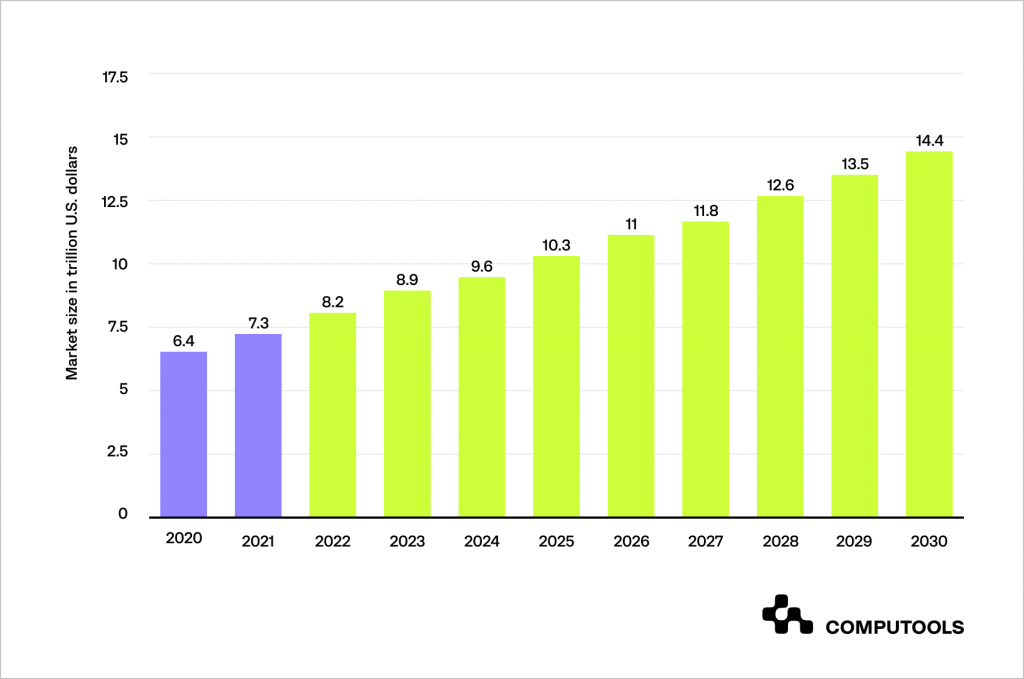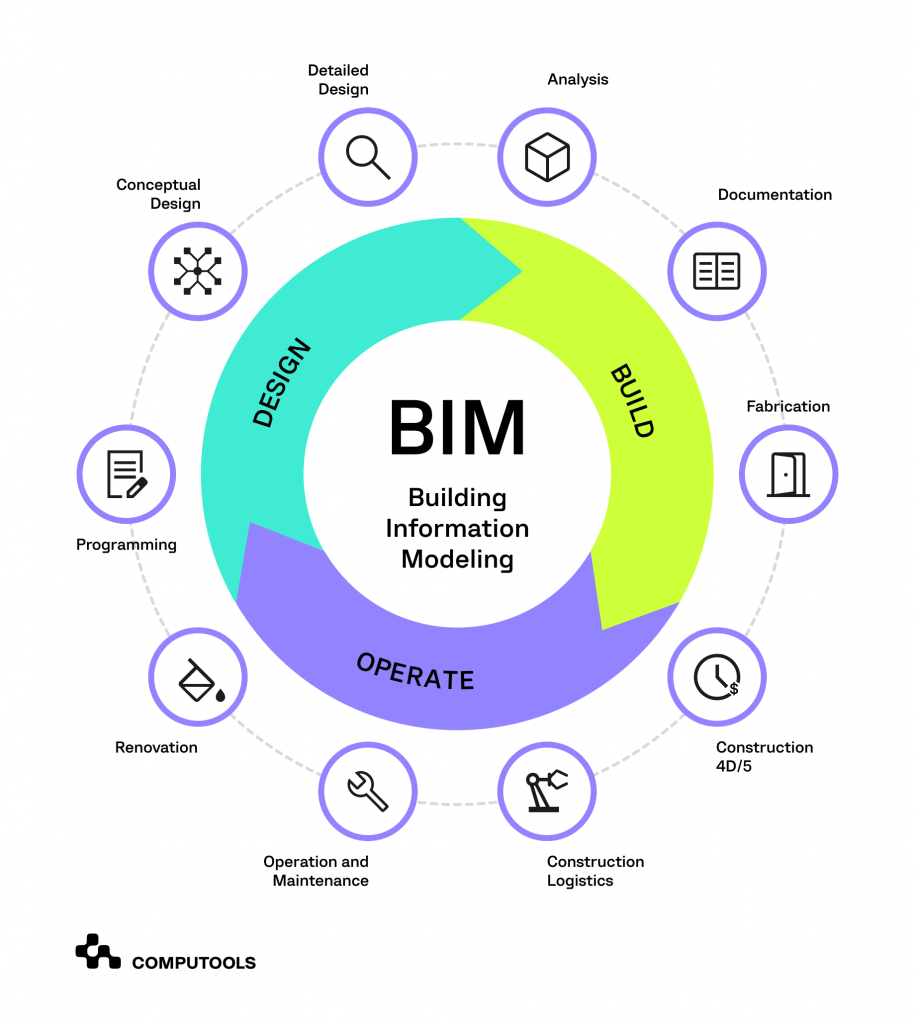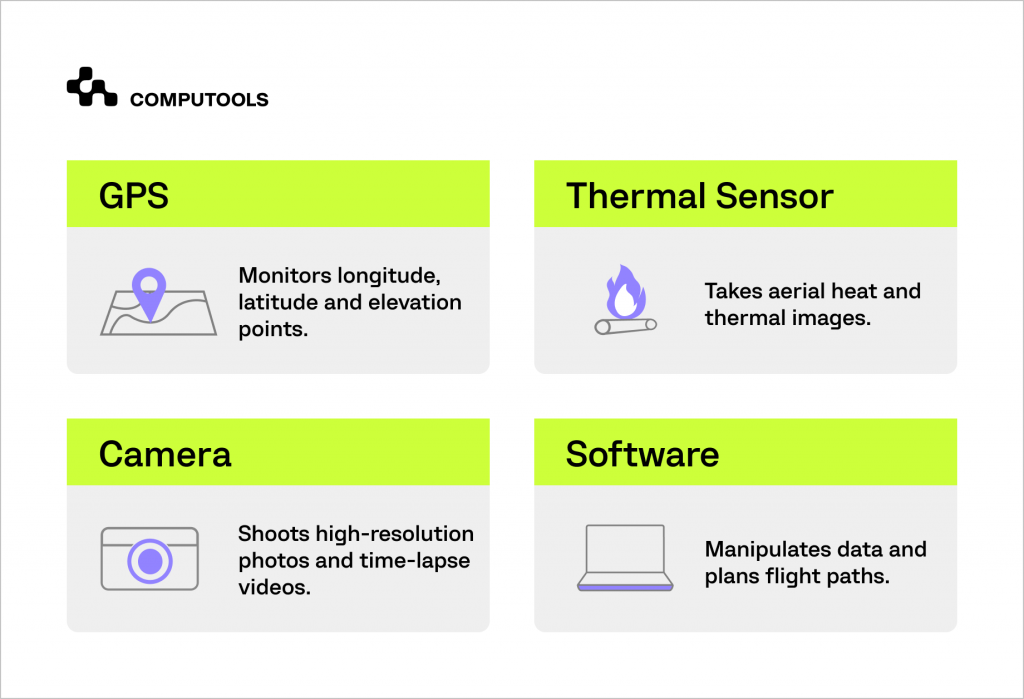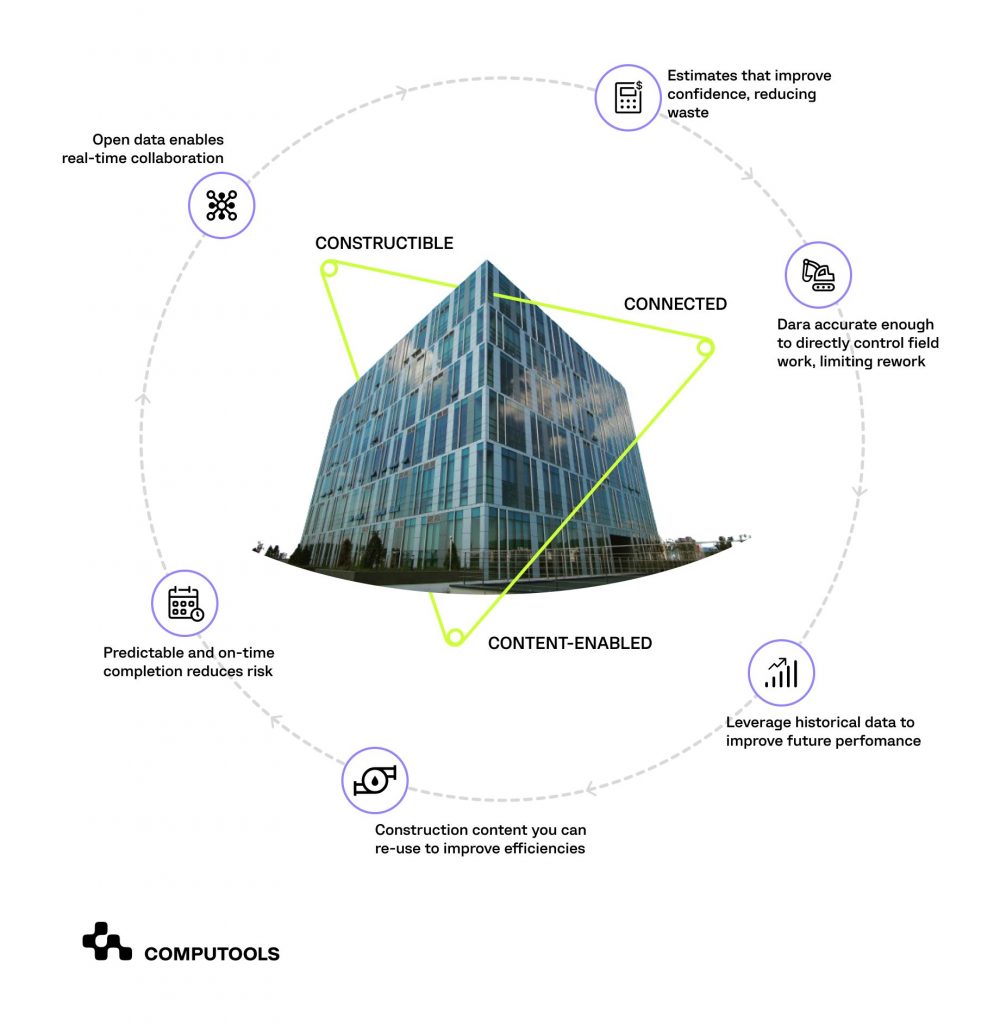Despite the common belief that businesses are slow to adopt technologies in the construction industry, the post-COVID period has shown a notable shift. The engineering and construction sectors not only weathered the pandemic but also emerged more resilient.
According to Statista, the global construction industry’s revenue is anticipated to experience a consistent increase in the coming years. By 2030, it is forecasted to be more than double its size in 2020, reaching US$14.4 trillion.

Several factors have already fuelled and will continue to influence the industry’s growth. The most significant among them is the continually increasing demand, driven by the growing number of people.
To meet the needs of an expected urban population of 10 billion citizens by 2050, approximately 13.000 buildings must be constructed every day.
Other factors include advancements in construction methods, technological innovations, software developments, market conditions and legislative support for emerging technologies.
Crucially, investments in infrastructure, energy and utility sectors have significantly contributed to driving overall construction production, aligning with ongoing market trends.
The introduction of digital innovations, like virtual and augmented reality, has democratised these trends, making them accessible and affordable for small and medium-sized businesses.
These advancements not only represent technological progress but also demonstrate an increased commitment to taking construction technology more seriously than ever before.
For those seeking to enhance their construction businesses, this article provides insights into key industry trends, highlighting the major role of software development in shaping the future of the construction sector.
7 Latest Technologies in the Construction Industry
1. Building Information Modelling (BIM)
The complex nature of commercial construction involves numerous specialists, such as architects, engineers, business professionals and contractors.
In the absence of BIM, these experts often work independently, leading to potential clashes in their plans when brought together.
BIM technology for buildings is like a smart tool that goes beyond traditional drawings. It creates a detailed model of a building, and unlike a static drawing, this model is dynamic and aware of the building’s properties.
For instance, if an architect introduces a design that might affect the structure of the house, the software promptly alerts the engineer, who can address the concern from a different view of the model.
Different visions of the building interact in real-time, ensuring that every stakeholder understands how their modifications impact the overall structure.
For example, deciding to redesign the layout to have more open spaces might lead to changes in the electrical wiring and lighting systems. This adjustment ensures that there’s enough illumination to properly light up the expanded, open areas.
Challenges: Implementing BIM may be challenging due to the complexity of transitioning from traditional methods. The industry’s resistance might slow down its adoption.
Benefits: BIM offers significant benefits for both SMEs and enterprises. It facilitates improved collaboration among stakeholders, fostering a more inclusive and efficient project visualisation.
BIM also enhances the efficiency of design and construction, providing valuable advantages for businesses in terms of project management and overall operational effectiveness.

2. Drones
In recent years, the adoption of drones has emerged as probably the most impactful construction technology. The use of drones in the sector has witnessed a remarkable year-on-year growth of 239%, outpacing the growth rates seen in all other commercial sectors.
Drones are valuable tools in the industry, offering a unique combination of aerial perspective and data collection functions. They impact projects throughout their entire life cycle, playing key roles from the initial stages to project completion.
Drone-captured photos and videos are helpful in surveying projects, tracking building progress and providing real-time updates. Drones are also equipped with features like cameras, GPS systems and thermal and infrared sensors, allowing them to gather essential data on construction sites.
This collected data can be easily transmitted to a computer using specialised drone software, enabling users to analyse, interpret and organise the information.
Challenges: The use of drones in construction may face problems such as regulatory restrictions, privacy concerns and initial set-up costs.
Benefits: Despite challenges, drones bring significant advantages to construction projects. They excel in tasks like aerial surveying, project monitoring, improving safety measures and cutting down both time and costs.

3. 3D Printing
3D printing stands out as a compelling example of construction technology, ushering in a new era of eco-friendly, efficient and cost-effective building practices.
This cutting-edge approach involves constructing structures layer by layer, allowing for the creation of intricate designs and shapes.
The printing technology can use different materials like concrete, steel and plastic, making the process easier and skipping unnecessary transportation steps.
Another benefit is that it can print structures right at the construction site, cutting down on waste, saving money on storage and accelerating timelines.
Challenges: Printers can be expensive and it is usually hard to find skilled workers for 3D printing.
Benefits: Unlike traditional methods, 3D printing does not reuse plans and templates, creating unique solutions for each project. Also, printers use only the materials they need, creating almost no waste at construction sites.
4. Robotics
After relying on traditional methods and machinery for many years, construction robots are now bringing about a revolution in industry efficiency and productivity.
These autonomous robots, functioning independently on construction sites, are capable of performing tasks akin to human workers.
There is a wide range of applications for these robots, from logistic robots specialising in material handling and transportation to robotic exoskeletons designed to assist construction workers with heavy lifting.
The integration of robotics in construction is set to expand further, incorporating various types of robots. The potential applications for autonomous robots are extensive; they can collaborate seamlessly with humans or operate independently without any intervention.
For instance, traditional machinery like bulldozers and loaders can undergo upgrades to autonomously handle a variety of tasks. An intelligent control system calculates precise movements and materials needed for a specific project.
Challenges: The potential displacement of human labour raises ethical considerations. Concerns about job security and the impact on employment opportunities for construction workers may slow down the implementation of robotics in the industry.
Benefits: Robotic technologies in the construction industry lead to increased efficiency, improved safety and precision in repetitive tasks, contributing to overall productivity.
5. Green Technologies
According to the UNEP, buildings contribute to approximately 40% of global carbon dioxide emissions. To mitigate this harmful impact, construction SMEs and enterprises are increasingly adopting various sustainable technologies.
Green technology in construction involves using software, materials or strategies that contribute to constructing environmentally friendly buildings, aiming for a reduced environmental impact.
Green construction practices seek to minimise water, energy and material use throughout the entire life cycle of the building: from planning, construction and operation to maintenance, renovation and demolition.
For example, the fuel used to transport goods and workers to construction sites can be substantial. Implementing technology like a route planner to minimise fuel consumption can have positive environmental benefits, reinforcing your commitment to a greener construction initiative.
Challenges: There is limited awareness of sustainable software solutions in the construction sector and resistance within the industry.
Benefits: Green technologies reduce environmental impact, enhance energy efficiency and align with green building standards, contributing to more sustainable practices.

6. Internet of Things (IoT)
Smart technology like IoT plays a major role in the construction industry by collecting data from connected devices through sensors and algorithms. This gathered information is beneficial for professionals to identify safety issues and ensure that construction is progressing as planned.
With the availability of real-time data through sensors, construction companies can respond quickly and efficiently.
According to the McKinsey report, the potential annual savings from leveraging IoT for equipment maintenance could exceed $360 billion. In simpler terms, the adoption of this new construction technology could result in SMEs and enterprises saving a substantial amount every year.
Wearables equipped with IoT technology can alert workers if they are approaching a hazardous area, preventing potential injuries.
Devices utilise IoT software to monitor factors like pressure, temperature and humidity and provide instant warnings for any potential dangers that require immediate attention. Additionally, IoT can be used to quickly map out the construction site.
Challenges: There are significant security concerns related to data transmission and storage, interoperability issues and challenges regarding data privacy.
Benefits: Except for real-time monitoring, IoT enables predictive maintenance, improved safety measures and optimised resource utilisation on construction sites.
7. Laser-Based Technologies
In the world of construction tech, a standout innovation is laser-based solutions. These cutting-edge tools consistently evolve each year, bringing a fresh perspective to construction projects.
Laser’s unique ability to scan and analyse real-world objects has proven invaluable for on-site surveys, mapping, project inspections, safety and various construction tasks. Thanks to its high accuracy, it simplifies construction planning, leading to significant cost savings.
Apart from scanning, laser applications are diverse. For instance, laser levelling tools ensure precise and accurate levelling of surfaces, enhancing the quality of construction projects. Laser-guided excavation equipment, on the other hand, brings efficiency to digging and earthmoving tasks, reducing both time and costs.
Challenges: High equipment costs and limited adoption in certain regions.
Benefits: Laser-based building technology enhances surveying accuracy, improves mapping capabilities and reduces the need for manual labour in certain construction tasks.
In the big picture, there is a growing demand for construction software development among both small and medium-sized enterprises and large corporations. Numerous specialised tools bring significant benefits, impacting profits, simplifying business processes and enhancing workforce management efficiency.
For businesses, investing in tailored software allows them to create flexible, customised programs that precisely meet their unique needs.
For example, the use of custom project management software can play a key role in streamlining workflows, while inspection apps may help construction teams conduct safety audits, ensuring compliance with industry regulations and reducing the risk of accidents.
Overall, innovations in construction have become integral to the sustained growth and success of businesses in the competitive construction landscape.
Technological Future of the Construction Industry
Looking ahead, the future of construction technology is expected to see increased activity, especially in such areas as manufacturing, transportation infrastructure and clean energy projects.
Small and medium businesses as well as enterprises in engineering and construction will further need to adapt to changing markets, comply with strict environmental regulations and meet rising customer expectations for environmentally friendly structures.
This is especially important given that buildings contribute substantially to global energy consumption and emissions.
To meet upcoming international goals, like the Net Zero Emissions by 2050 Scenario, the trend for green practices and sustainable materials is expected to remain among the most popular.
Key business strategies are likely to include reducing carbon in construction materials and employing energy-efficient equipment to minimise overall emissions throughout a building’s life.
With the increasing frequency of severe weather events, future trends also suggest a heightened focus on resilient design.
This shift is likely to create opportunities for the development of advanced materials like self-healing concrete and innovations like simulations, digital twins and building information modelling (BIM).
The integration of IoT sensors, data analytics and construction software development is anticipated to further contribute to an optimal balance between sustainability and efficiency in the year 2024 and beyond.
Final Thoughts
The construction sector is experiencing a substantial shift, driven by the integration of emerging technologies. These advancements bring increased efficiency, productivity and safety to business and construction processes.
Through the adoption of virtual and augmented reality, robotics and other cutting-edge technologies, construction SMEs and enterprises can streamline operations, cut costs, minimise waste and enhance overall project success.
Although some of these technology trends in construction are in their early stages, they hold significant potential for reshaping the future of the industry. As the sector evolves, we can anticipate witnessing more captivating developments in the coming years.
If you’re part of the construction industry and eager to delve into these technological trends, reach out to us by emailing info@computools.com. We’re here to help you get started.
Computools
Software Solutions
Computools is an IT consulting and software development company that delivers innovative solutions to help businesses unlock tomorrow.









“Computools was selected through an RFP process. They were shortlisted and selected from between 5 other suppliers. Computools has worked thoroughly and timely to solve all security issues and launch as agreed. Their expertise is impressive.”